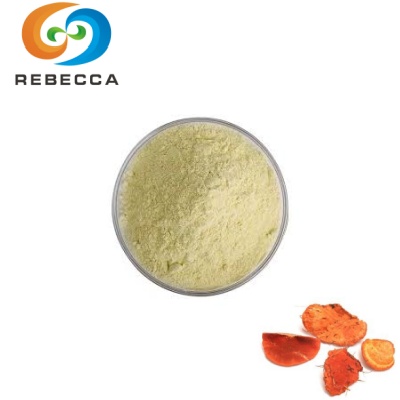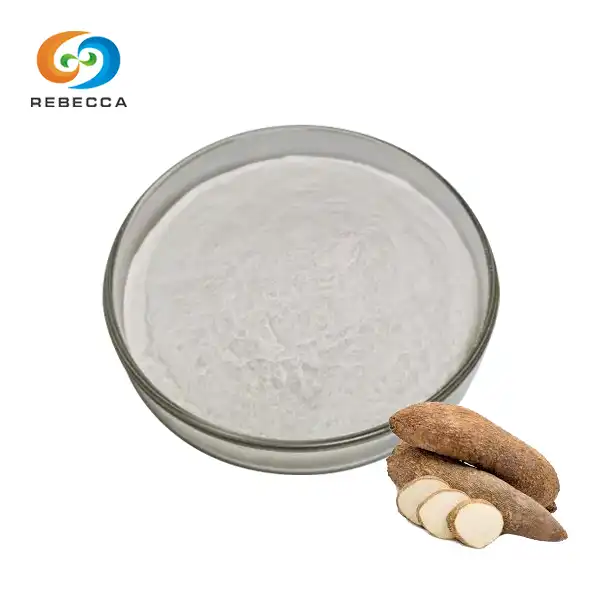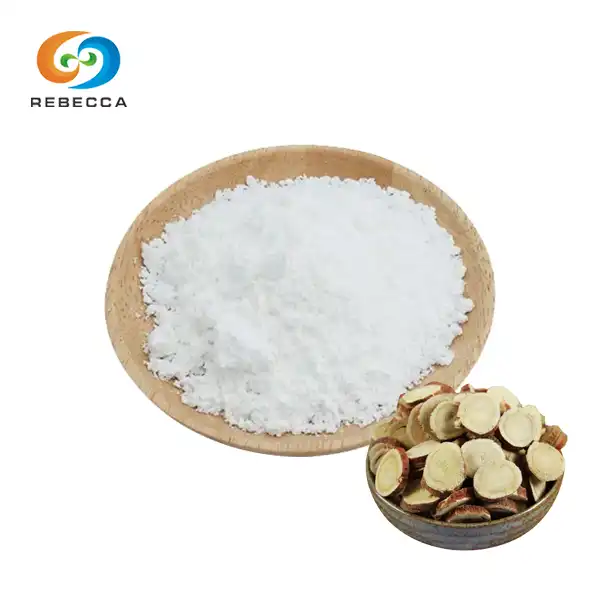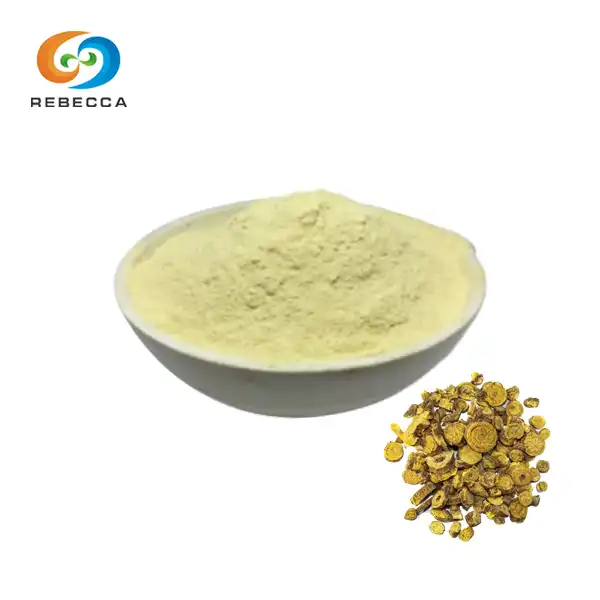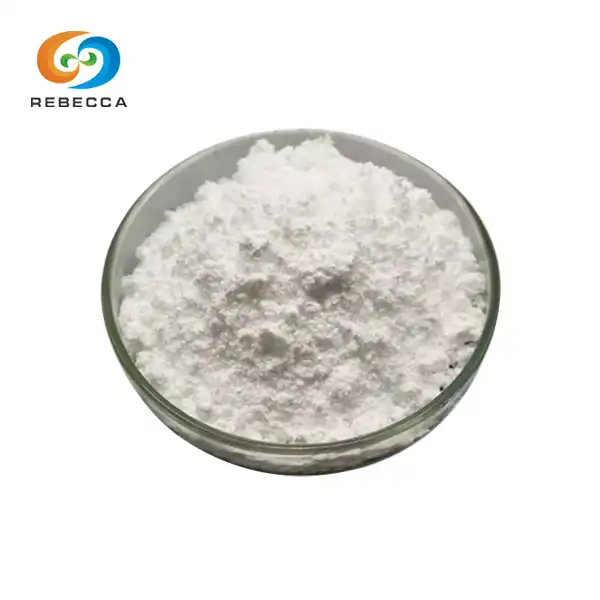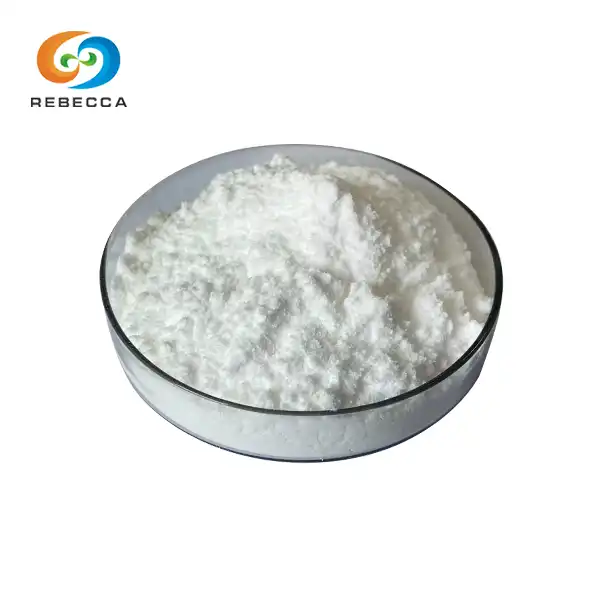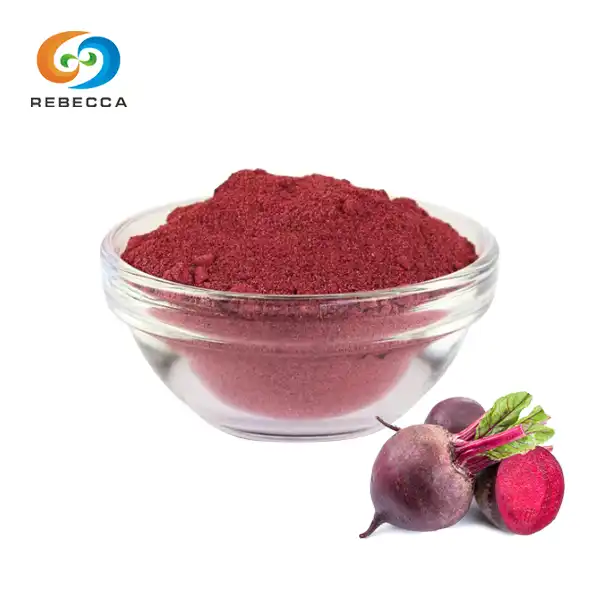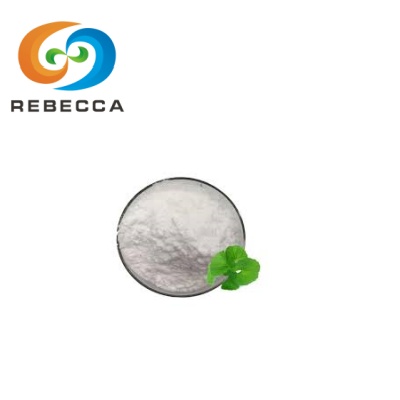How to store and measure vitamin B12 powder for accuracy?
Proper storage and accurate measurement of vitamin b12 powder are crucial for maintaining its potency and ensuring precise dosing. To store vitamin B12 effectively, keep it in a cool, dry place away from direct light and moisture. For accurate measurements, use digital scales capable of measuring milligrams or specialized micro-scoops. Always handle the powder with clean, dry utensils to prevent contamination.

1. Product Name:Vitamin B12 (Cyanocobalamin)
2. CAS No.:68-19-9
3. Specification: 99%
4. Test Method: HPLC
Proper storage techniques for B12 stability
Temperature control: Keep B12 powder cool and dry
Maintaining the stability of vitamin B12 powder requires careful attention to temperature control. Cyanocobalamin, the synthetic form of vitamin B12, is sensitive to heat and can degrade when exposed to high temperatures. To preserve its potency, store your B12 powder in a cool environment, ideally between 59°F and 77°F (15°C to 25°C).
Avoid placing the powder near heat sources such as radiators, stoves, or direct sunlight. A pantry or kitchen cabinet away from appliances that generate heat is an excellent storage location. For long-term storage, consider using a dedicated supplement refrigerator set to a consistent temperature.
Humidity is another factor that can affect B12 powder stability. Excess moisture can lead to clumping and potentially promote bacterial growth. To combat this, store your B12 powder in an area with low humidity. If you live in a particularly humid climate, consider using dehumidifiers in your storage area to maintain optimal conditions.
Light protection: Store B12 in opaque containers
Light exposure can significantly impact the stability of vitamin B12 powder. Ultraviolet (UV) rays and even artificial light can cause photodegradation, reducing the potency of the supplement. To protect your B12 powder from light-induced deterioration, always store it in opaque containers.
Amber or dark-colored glass jars are excellent choices for B12 powder storage. These containers effectively block out harmful UV rays while still allowing you to see the contents. If your B12 powder comes in a clear container, consider transferring it to a light-resistant container or storing the original packaging inside a dark, opaque box.
When selecting storage containers, opt for those with airtight seals to prevent exposure to both light and air. This additional barrier helps maintain the powder's integrity and prevents oxidation, which can occur when B12 is exposed to oxygen over time.

Moisture prevention: Use desiccants for long-term storage
For long-term storage of vitamin B12 powder, incorporating desiccants into your storage strategy can significantly enhance its shelf life. Desiccants are substances that absorb moisture from the surrounding environment, creating a dry atmosphere within the storage container.
Silica gel packets are commonly used desiccants that effectively absorb moisture. Place one or two packets in your B12 powder container, ensuring they don't come into direct contact with the powder. Alternatively, you can use molecular sieves, which are highly effective at creating a moisture-free environment.
When using desiccants, it's essential to replace them periodically, especially if you open the container frequently. This ensures continued protection against moisture. Remember to handle desiccants with care and keep them away from children and pets, as they can be harmful if ingested.
Tools for precise B12 powder measurement
Digital scales: Ensuring accuracy to the milligram
Accurate measurement of vitamin B12 powder is crucial for proper dosing and formulation. Digital scales offer the precision necessary for handling small quantities of B12 powder. When selecting a digital scale for this purpose, look for models with a readability of at least 0.01 grams (10 milligrams) or better.
High-precision laboratory scales can measure down to 0.001 grams (1 milligram), which is ideal for working with vitamin B12 powder. These scales often come with features like tare functions, which allow you to subtract the weight of the container, ensuring you're only measuring the powder itself.
When using digital scales, place them on a stable, flat surface away from vibrations or air currents that could affect the reading. Regularly calibrate your scale using certified weights to maintain accuracy over time. Remember to zero the scale before each measurement and use a clean, dry weighing paper or boat to prevent contamination of your B12 powder.
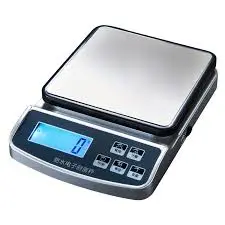
Micro-scoops: Perfect for small B12 powder doses
Micro-scoops are invaluable tools for measuring small quantities of vitamin B12 powder, especially for individual doses or when working with limited amounts. These tiny scoops come in various sizes, typically ranging from 0.1 to 5 milligrams in capacity.
When using micro-scoops, it's essential to choose the appropriate size for your needs. For example, a 1-milligram scoop might be suitable for measuring individual doses of B12 powder for personal use, while larger scoops may be more appropriate for bulk formulations.
To ensure accuracy when using micro-scoops, always level off the powder using a clean, straight edge. This prevents overfilling and ensures consistent measurements. It's also crucial to clean and dry the scoop thoroughly between uses to prevent cross-contamination and maintain accuracy.
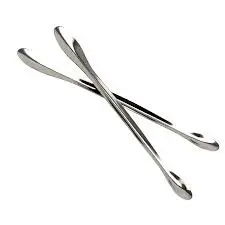
Calibrated measuring spoons: Quick B12 portioning
For larger quantities of vitamin B12 powder, calibrated measuring spoons can provide a quick and convenient method of portioning. These specialized spoons are designed to measure precise volumes of powder and are particularly useful in manufacturing or bulk preparation settings.
When using calibrated measuring spoons, select a size appropriate for your needs. Common sizes include 1/64 teaspoon (about 0.1 mL) up to 1 tablespoon (15 mL). To ensure accuracy, always fill the spoon to the brim and level it off with a straight edge, such as a clean spatula or knife.
While calibrated measuring spoons are convenient, they may not offer the same level of precision as digital scales or micro-scoops for very small quantities. Use them in conjunction with other measurement methods when working with vitamin B12 powder to achieve the best balance of speed and accuracy in your formulations.
Common mistakes in B12 powder handling
Contamination risks: Avoiding B12 powder exposure
One of the most common mistakes in handling vitamin B12 powder is inadvertently exposing it to contaminants. Even small amounts of moisture, bacteria, or foreign particles can compromise the purity and efficacy of the powder. To minimize contamination risks, always work in a clean, dry environment when handling B12 powder.
Use clean, dedicated utensils for measuring and transferring the powder. Avoid using the same tools for different substances without thorough cleaning. When opening containers of B12 powder, ensure your hands are clean and dry, and work in an area free from drafts or potential sources of airborne contaminants.
If you need to transfer B12 powder between containers, use a clean, dry funnel to minimize spillage and reduce the risk of introducing contaminants. Always seal containers immediately after use to prevent prolonged exposure to air and potential contaminants.
Overdosing hazards: Why precise B12 measurement matters
Accurate measurement of vitamin B12 powder is crucial to prevent potential overdosing. While vitamin B12 is generally considered safe, excessive intake can lead to adverse effects in some individuals. Precise measurement ensures that you're administering the intended dose, whether for personal use or in product formulations.
When measuring B12 powder, always use calibrated instruments and double-check your measurements. If you're unsure about the accuracy of your measurement, it's better to err on the side of caution and remeasure. For complex formulations, consider using a checklist or having a second person verify measurements to reduce the risk of errors.
Remember that the potency of B12 powder can vary between batches or suppliers. Always refer to the specific product documentation for recommended dosages and adjust your measurements accordingly. If you're formulating products for others, ensure clear labeling and provide precise dosing instructions to prevent end-user overdosing.
Shelf-life errors: Recognizing expired B12 powder
Failing to recognize expired vitamin B12 powder is a common mistake that can lead to reduced efficacy or potential health risks. Always check the expiration date on your B12 powder container and adhere to it strictly. However, expiration dates are only valid if the powder has been stored correctly.
Signs of expired or degraded B12 powder include changes in color, texture, or odor. Fresh B12 powder is typically a light pink to red color. If you notice darkening, clumping, or an unusual smell, it's best to discard the powder and replace it with a fresh supply.
To maximize shelf life, implement a first-in, first-out (FIFO) system for your B12 powder inventory. Label containers with the date of opening and regularly inspect your stock for any signs of degradation. By being vigilant about shelf life and storage conditions, you can ensure that your B12 powder remains potent and safe for use throughout its intended lifespan.
Proper storage and accurate measurement of vitamin B12 powder are essential for maintaining its potency and ensuring safe, effective use. By implementing temperature control, light protection, and moisture prevention strategies, you can significantly extend the shelf life of your B12 powder. Utilizing precision tools like digital scales, micro-scoops, and calibrated measuring spoons enables accurate dosing and formulation. Avoiding common handling mistakes such as contamination, overdosing, and ignoring expiration dates is crucial for optimal results. By following these guidelines, you can confidently work with vitamin B12 powder, whether for personal supplementation or product development, ensuring its quality and efficacy.
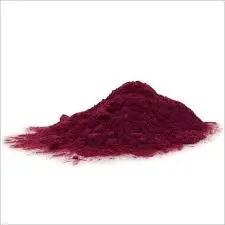
Vitamin B12 Powder For Sale
Shaanxi Rebeccia offers premium-quality vitamin B12 (Cyanocobalamin) powder, perfect for your nutritional supplement needs. Our product boasts a 99% purity level, verified through rigorous HPLC testing (CAS No.: 68-19-9). Our state-of-the-art production facility adheres to strict GMP and ISO standards, ensuring consistent batch quality and global compliance. From raw material selection to final packaging, our comprehensive quality control process guarantees a safe, potent product. Whether you're a pharmaceutical R&D company seeking high-purity active ingredients or a health supplement brand looking for reliable B12 powder, we've got you covered. Experience the Shaanxi Rebeccia difference – where quality meets innovation. Ready to elevate your B12 formulations? contact us at information@sxrebecca.com to discuss your vitamin B12 powder requirements and discover how we can support your product development goals.
References
- Watanabe, F. (2007). Vitamin B12 sources and bioavailability. Experimental Biology and Medicine, 232(10), 1266-1274.
- Green, R., Allen, L. H., Bjørke-Monsen, A. L., Brito, A., Guéant, J. L., Miller, J. W., ... & Yajnik, C. (2017). Vitamin B12 deficiency. Nature Reviews Disease Primers, 3(1), 1-20.
- O'Leary, F., & Samman, S. (2010). Vitamin B12 in health and disease. Nutrients, 2(3), 299-316.
- Obeid, R., Fedosov, S. N., & Nexo, E. (2015). Cobalamin coenzyme forms are not likely to be superior to cyano-and hydroxyl-cobalamin in prevention or treatment of cobalamin deficiency. Molecular Nutrition & Food Research, 59(7), 1364-1372.
- Thakkar, K., & Billa, G. (2015). Treatment of vitamin B12 deficiency–methylcobalamin? Cyancobalamin? Hydroxocobalamin?—clearing the confusion. European Journal of Clinical Nutrition, 69(1), 1-2.
- Ruscin, J. M., Page, R. L., & Valuck, R. J. (2002). Vitamin B12 deficiency associated with histamine2-receptor antagonists and a proton-pump inhibitor. Annals of Pharmacotherapy, 36(5), 812-816.
